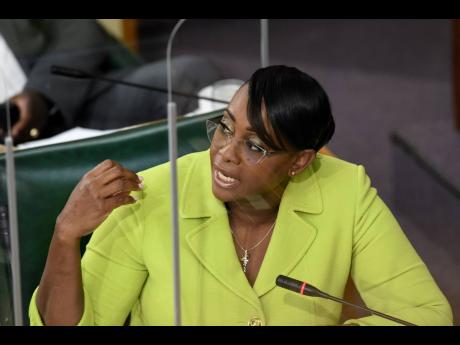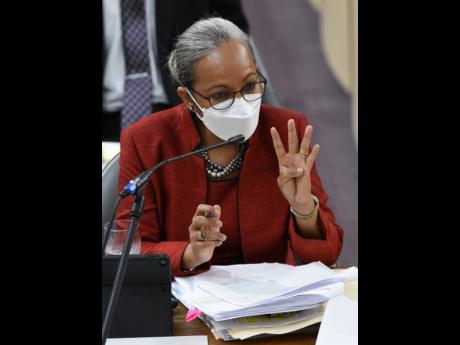Welfare funds for poor sitting idle in bank
Government member of Parliament’s Public Accounts Committee (PAC) Juliet Holness was peeved on Tuesday that nearly $550 million in benefits targeting the poorest of Jamaicans under the Programme of Advancement Through Health and Education (PATH)...
Government member of Parliament’s Public Accounts Committee (PAC) Juliet Holness was peeved on Tuesday that nearly $550 million in benefits targeting the poorest of Jamaicans under the Programme of Advancement Through Health and Education (PATH) had been returned to the Consolidated Fund.
Auditor General Pamela Monroe Ellis, in her annual report, highlighted that her analysis of payments for beneficiaries ranging from pregnant or lactating women up to grade 13 students for April 2019 to February 2020 revealed that 72,459 individuals were non-compliant, resulting in the non-disbursement of $277.86 million over the period.
Further, the auditor general reported that approximately $270.79 million in cash grants disbursed under the programme remained uncollected.
“We don’t look favourably on those types of savings because it is savings from what should be the poorest of the poor, and the most vulnerable, and the persons who are dependent on our intervention – both education and health – all of these benefits going back,” Holness stated.
Permanent secretary in the Ministry of Labour and Social Security (MLSS), Colette Roberts-Risden, said, in response, that she had not done a mass calculation but was moved “to go back and examine the figures”.
However, it was the $77 million of the $270.79 million disbursed to the bank under a prepaid cash card facility that remained unclaimed since 2017 which triggered intense scrutiny from some committee members.
The money was intended for 1,823 PATH beneficiaries but remained with the bank for some three years.
Explaining the process, Roberts-Risden said that if beneficiaries did not collect the money for two cycles, spanning four months, the funds were recalled from the bank by the ministry. She added that the sum would then be returned to the Consolidated Fund.
She also indicated that the ministry would conduct investigations to determine whether people had migrated, died, or if their socio-economic circumstances had changed.
But committee member Dr Morais Guy wanted to know how, and why, the money had sat there idle.
In her response, Roberts-Risden said: “It was last year that it was through internal audit that it was brought to my attention that the monies were not being recalled.
“When it was brought to my attention, immediately the instruction was given that we need to recall these funds and pay them over into the Consolidated Fund.”
Committee members pressed Roberts-Risden on whether the ministry had carried out an investigation to ascertain why the 1,823 people did not access the benefit.
“I really couldn’t give you that information now,” the permanent secretary said initially, later admitting that “we have not studied that figure and disaggregated it”.
Roberts-Risden told the committee that the ministry was currently working with a ratio of one social worker to 1,000 PATH beneficiaries.
Committee member Dwight Sibblies argued that with a ratio of 1:1,000, the system was destined to fail.
Sibblies suggested an overhaul of PATH welfare, a proposal welcomed by Roberts-Risden. She said that a comprehensive review was needed nearly 20 years after its roll-out.


